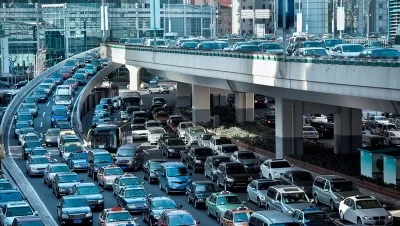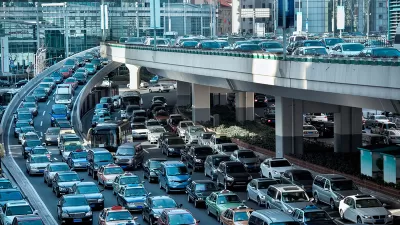The unpredictability of constantly changing commuting trends has some workers seeing much longer commute times as transportation agencies work to adjust to new travel patterns.

Despite expectations that the rise of remote work would shorten commutes—and data from the Census Bureau showing that to be, on average, true—“Experts say they are seeing traffic turmoil in many U.S. metropolitan areas, particularly those with government, tech and other jobs that lend themselves to hybrid schedules.”
As Katherine Shaver reports in the Washington Post, “Commutes now concentrated into a few days a week are causing noticeable swings in daily traffic volumes — motorists say Wednesdays are the worst — while greater flexibility in when to leave home has changed the timing of the morning rush.” According to Shaver, “Traffic at the height of rush hour feels as bad as ever in the Washington region and other large metro areas, experts say, because even a small increase tips a heavily saturated road network from free-flowing to stop-and-go.” The morning rush has been more affected by the pandemic than the evening rush hour, when more people run personal errands.
In Montgomery County, the traffic management system has been adjusting the timing of traffic lights to adapt to changing commute patterns, and Washington, D.C.’s Department of Transportation is working on an analysis of whether similar adjustments are necessary in the District. The region’s rail system, Metrorail, hit its highest ridership numbers since the pandemic began last Wednesday, but is still at only 44 percent of pre-pandemic trips.
FULL STORY: Why hybrid work schedules have made some commutes worse

Planetizen Federal Action Tracker
A weekly monitor of how Trump’s orders and actions are impacting planners and planning in America.

Map: Where Senate Republicans Want to Sell Your Public Lands
For public land advocates, the Senate Republicans’ proposal to sell millions of acres of public land in the West is “the biggest fight of their careers.”

Restaurant Patios Were a Pandemic Win — Why Were They so Hard to Keep?
Social distancing requirements and changes in travel patterns prompted cities to pilot new uses for street and sidewalk space. Then it got complicated.

Platform Pilsner: Vancouver Transit Agency Releases... a Beer?
TransLink will receive a portion of every sale of the four-pack.

Toronto Weighs Cheaper Transit, Parking Hikes for Major Events
Special event rates would take effect during large festivals, sports games and concerts to ‘discourage driving, manage congestion and free up space for transit.”

Berlin to Consider Car-Free Zone Larger Than Manhattan
The area bound by the 22-mile Ringbahn would still allow 12 uses of a private automobile per year per person, and several other exemptions.
Urban Design for Planners 1: Software Tools
This six-course series explores essential urban design concepts using open source software and equips planners with the tools they need to participate fully in the urban design process.
Planning for Universal Design
Learn the tools for implementing Universal Design in planning regulations.
Heyer Gruel & Associates PA
JM Goldson LLC
Custer County Colorado
City of Camden Redevelopment Agency
City of Astoria
Transportation Research & Education Center (TREC) at Portland State University
Camden Redevelopment Agency
City of Claremont
Municipality of Princeton (NJ)





























